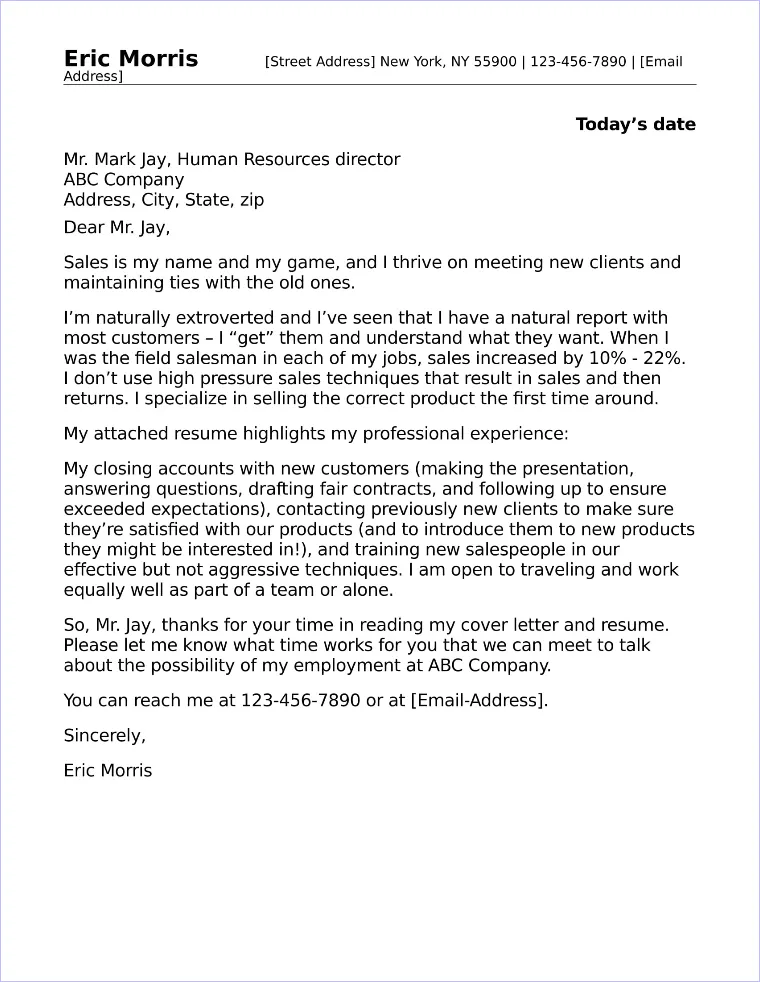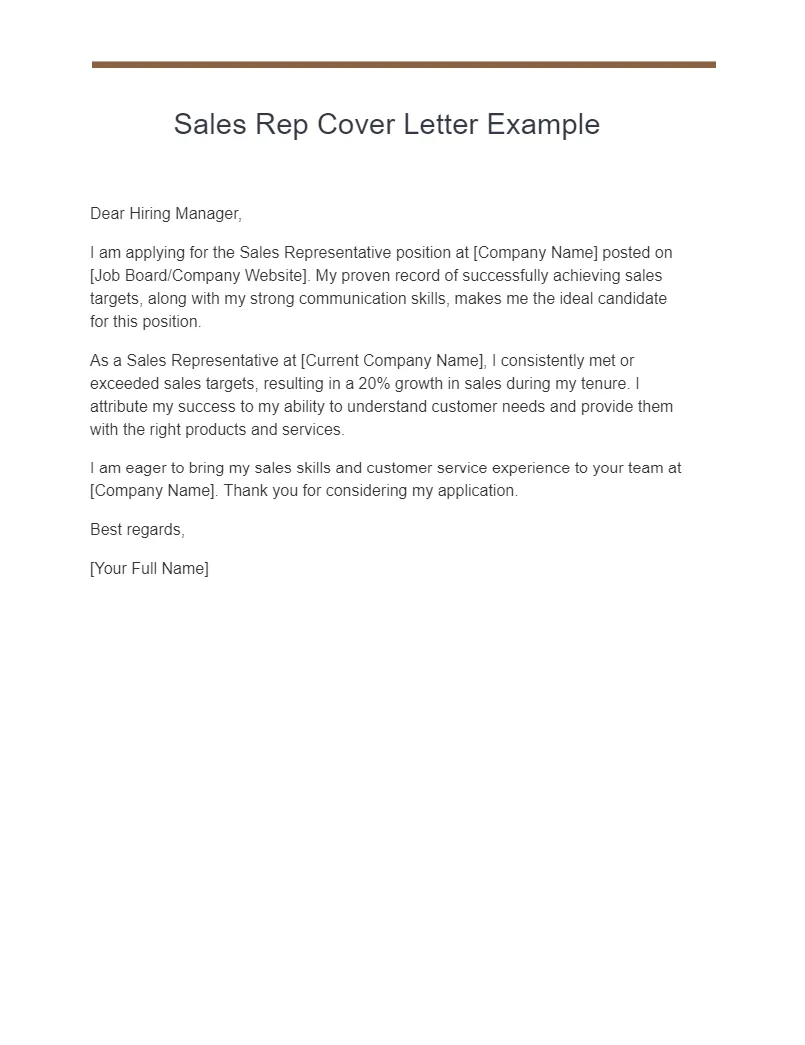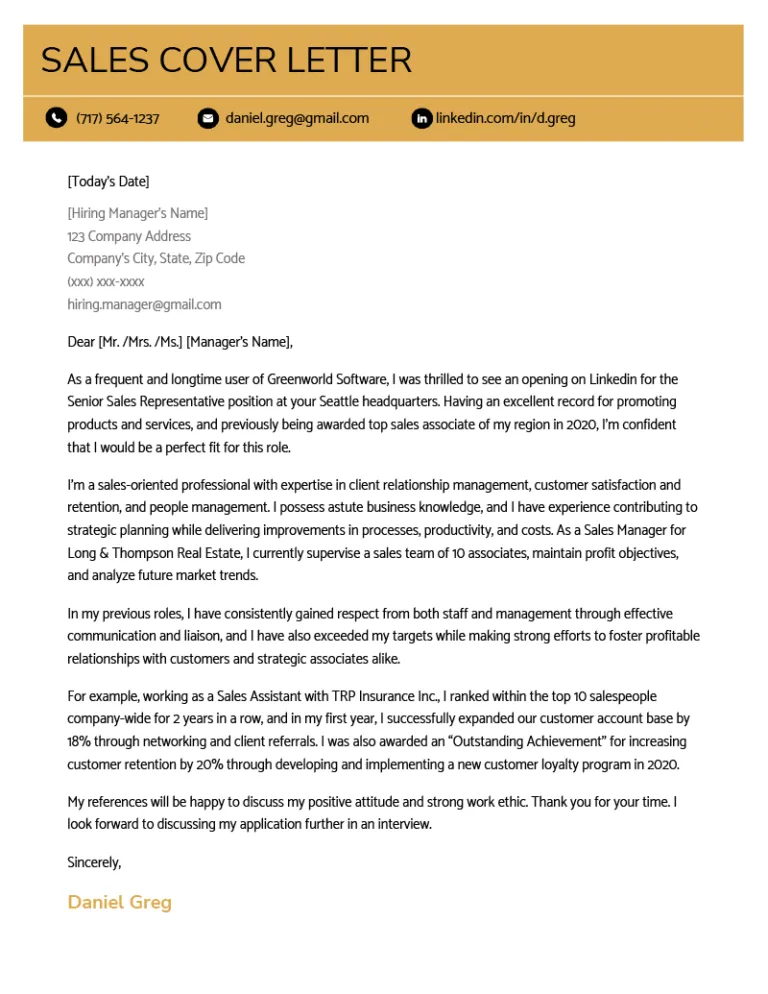Why Your Sales Cover Letter Matters
In the competitive world of sales, a compelling cover letter can be your golden ticket to landing your dream job. It’s not just a formality; it’s your first opportunity to make a strong impression and convince a potential employer that you’re the perfect fit. A well-crafted sales cover letter goes beyond simply listing your qualifications; it tells a story, showcasing your personality, enthusiasm, and the unique value you bring to the table. It’s where you can truly connect with the hiring manager and make them excited to learn more about you. Failing to write a strong cover letter, on the other hand, can be a missed opportunity, potentially leading your application straight into the ’no’ pile. Therefore, understanding the importance of a cover letter and investing time in its creation is a crucial step in your job search journey.
Grabbing Attention with Your Sales Cover Letter
Your sales cover letter needs to grab the reader’s attention from the very first sentence. This isn’t the time for generic introductions; instead, aim for an opening that is both engaging and relevant. Start with a strong hook, perhaps a brief anecdote that demonstrates your sales prowess or a bold statement about your accomplishments. Show, don’t just tell, the hiring manager what you’re capable of. Then, clearly state the position you’re applying for and where you found the opportunity. Keep the tone energetic and enthusiastic. Show genuine interest in the company and the role. Research the company, and demonstrate your understanding of their products or services. Personalize the letter to the specific job and company to show that you have taken the time to understand their needs.
Highlight Your Sales Accomplishments

Your cover letter is the perfect place to shine the spotlight on your sales accomplishments. However, don’t just list your responsibilities; highlight the achievements that set you apart from other candidates. Focus on quantifiable results and specific examples of how you exceeded expectations in previous roles. Instead of saying ‘Managed a sales team’, you might say ‘Led a sales team of 10, increasing quarterly revenue by 20%’. Focus on what you achieved and the positive impact you made on the company’s bottom line. Provide context to give the reader a clearer understanding of your performance. Use action verbs to describe your contributions. Showcase your ability to drive revenue growth, build relationships, and close deals. Tailor these accomplishments to align with the job requirements mentioned in the job description.
Quantify Your Achievements
Numbers speak volumes in sales. Whenever possible, quantify your achievements to provide concrete evidence of your success. Instead of saying ‘Increased sales’, say ‘Increased sales by 30% in one year’. Instead of ‘Exceeded targets’, state ‘Consistently exceeded sales targets by an average of 15% each quarter’. Use data to prove your value and demonstrate your ability to drive results. Include metrics such as revenue generated, new clients acquired, sales targets exceeded, and conversion rates. Use percentages, dollar amounts, and any other relevant figures to illustrate your impact. When you can, compare your performance to previous periods or benchmarks to show the scale of your success. This approach makes your accomplishments more compelling and memorable.
Showcase Your Sales Skills
Beyond your achievements, a strong sales cover letter should highlight the specific skills that make you a successful salesperson. Identify the key skills required for the job and demonstrate how you possess them. Mention your ability to build and maintain client relationships, identify customer needs, and close deals. Use the job description as a guide and tailor your skills to match the requirements. Be specific and provide examples to illustrate how you have used these skills in the past. Focus on skills such as lead generation, negotiation, customer relationship management (CRM), and sales strategy. Show the hiring manager that you are a well-rounded sales professional with the necessary skills to excel in the role. Back up your claims with relevant experiences and accomplishments.
Communication Skills

Effective communication is a cornerstone of success in sales. Your cover letter provides a unique opportunity to demonstrate your communication skills. Use clear, concise, and persuasive language. Proofread carefully to ensure there are no grammatical errors or typos. Highlight your ability to build rapport, listen actively, and tailor your message to different audiences. Show your persuasive writing abilities. Use a professional tone, but let your personality shine through. Demonstrate your ability to articulate complex information in a clear and understandable way. Show that you can communicate effectively both verbally and in writing. The cover letter is, in essence, a sales pitch, and it should persuade the reader of your abilities.
Closing the Deal with Your Cover Letter
The final paragraph of your cover letter is your opportunity to ‘close the deal’ and express your enthusiasm for the opportunity. Reiterate your interest in the position and the company, and summarize your key qualifications. Show the hiring manager that you’re the best candidate for the role. Use a call to action to encourage them to take the next step, such as ‘I am eager to discuss how my skills and experience can benefit your company. Thank you for your time and consideration’. End with a professional closing, such as ‘Sincerely’ or ‘Best regards’, followed by your name and contact information. Ensure your contact information is up-to-date and includes your phone number and email address.
Call to Action
A strong call to action motivates the reader to take the next step in the hiring process. Make it clear what you want them to do, such as scheduling an interview or contacting you for more information. Express your enthusiasm for the opportunity and your readiness to discuss your qualifications further. Make it easy for them to reach out to you by including your contact information. Consider adding a sentence like, ‘I am available for an interview at your earliest convenience, and I look forward to hearing from you.’ Always end with a positive and confident tone. A well-crafted call to action can make a significant difference in whether or not you get called for an interview.
Formatting Tips for Sales Cover Letters

The formatting of your cover letter is just as important as the content. Your cover letter should be easy to read, well-organized, and visually appealing. Use a professional-looking font, such as Times New Roman, Arial, or Calibri, and ensure that the font size is between 10 and 12 points. Use clear headings and subheadings to break up the text and make it easier to scan. Ensure the letter has good spacing between paragraphs. Use bullet points to highlight your accomplishments and skills, making the key information stand out. Keep the letter concise, ideally no more than one page. Follow the standard business letter format, and include your contact information at the top of the letter. Consider using a template to save time and ensure consistency, but personalize it for each application. Make sure the formatting is consistent throughout.
Choosing the Right Font and Size
The choice of font and font size can significantly impact the readability of your cover letter. The right font should be professional and easy to read. Times New Roman, Arial, and Calibri are all suitable options. Avoid using overly decorative or unusual fonts, as they can distract from your message. The font size should be between 10 and 12 points, ensuring the text is easily readable without being too large or too small. Consistency is also important; use the same font and size throughout the entire document. Proper formatting helps the reader focus on your content. Before sending, it’s wise to test your cover letter on different devices to ensure the font and size display correctly.
Proofreading and Editing Your Cover Letter
Proofreading and editing your cover letter is an essential step in ensuring your application makes a positive impression. Always proofread your cover letter for any typos, grammatical errors, and inconsistencies. Use a spell checker, but don’t rely on it entirely; errors can still slip through. Read your cover letter aloud to catch awkward phrasing or sentences that don’t flow well. Ask a friend, family member, or career advisor to review your cover letter and provide feedback. Ensure all details are accurate, including the name of the hiring manager and the company name. Check that your contact information is correct. Pay close attention to your language and tone, and make sure it is professional and appropriate for the role. Proofreading and editing are crucial in preventing mistakes that could undermine your application.
